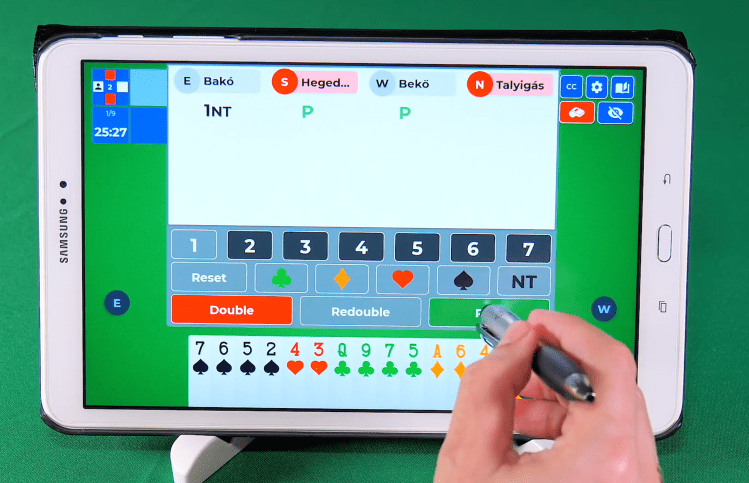Bridge tournaments played face-to-face might soon introduce the use of tablets instead of physical playing cards and bidding boxes. The United States Bridge Federation (USBF) is one organization considering the option of tablets for its 2021 USBCs. Health concerns and easier record-keeping are just some reasons why tablets could be a better bet.
Tablet Talk: How Tablets Will Change Face-to-Face Bridge Tournaments

Tablet Talk: How Tablets Will Change Face-to-Face Bridge Tournaments
By Alex J. Coyne © Great Bridge Links 2021
Bridge tournaments played face-to-face might soon introduce the use of tablets instead of physical playing cards and bidding boxes. The United States Bridge Federation (USBF) is one organization considering the option of tablets for its 2021 USBCs. Health concerns and easier record-keeping are just some reasons why tablets could be a better bet.
Great Bridge Links and Alex spoke to Jan Martel about the potential future of tablets in face-to-face bridge tournaments.
Face-to-Face with Tablets (versus Playing Online Bridge)
“Playing face-to-face on tablets is not the same as playing online.” says Martel. “Some people seem to confuse the two, and are negative about tablets because they don’t like the isolation and opportunity for illegal communication between online partners.”
Negative opinions regarding tablets are also voiced by traditionalist players who prefer the tactile sensation of real cards. Amidst the COVID-19 pandemic and sports cheating scandals, are physical card decks really worth the added risks?
For now, Martel says the USBF is still considering its options for October.
Competitive bridge played face-to-face (though augmented with tablets) makes cheating difficult, but keeping track of the game effortless. Assuming that correct protocols are followed, potential health risks can also be reduced.
Tournaments & Tablets: How it Works
“The concept of using tablets instead of boards, cards, and bidding boxes is simple,” says Martel.
“Each player has a tablet, on which the player’s hand is displayed. For the bidding, the tablet has a box in which are listed the available bids. The player clicks on the one they want to make.”
Screens are optional. Martel notes that the bid might show for either the player’s team-mate, or for all other players. From there, the bid can be explained by the bidder or their partner if there’s a need to.
“Without screens, players can see and talk to each other.” When screens are present for the game, screen-mates can converse – but Martel says that with four players in a single room, the “talk” can be typed on the tablet instead (or just written down where needed).
The virtual bidding box disappears after bidding has ended.
“After the opening lead, the dummy is displayed on all of the tablets. Each player selects the card to play to each trick using a stylus or mouse. Other than that, everything is the same as with cards.”
The most important factor seems to be augmenting and improving face-to-face play, instead of attempting to change it.
Easier for Bridge: Here’s Why
“From the tournament organizer’s point-of-view, using tablets makes many things easier.” Martel emphasizes. “There is no need to make and distribute boards before play can start.”
Tablet-based tournaments also provide a complete record of bidding and play, says Martel. Time-stamps are recorded for each action, and Martel notes this is meant to make the process easier for tournament directors.
“Scores are sent electronically from the tablets to the main server. Spectators, journalists, and appeals committees have the complete bidding and play record from all tables in play.“
Chances of fouled boards are also less, says Martel. “For tournaments where boards would be moved from one table to another, there are no fouled boards because two players had their hands out of the board at once and returned them to the wrong pockets.”
Software: What’s the Plan?
“The software for using tablets can be delivered by different companies,”
If tablets are used for the 2021 USBCs, Martel says that the preferred software is LoveBridge. “LoveBridge has been the main developer of software for face-to-face play using tablets.”
- Read our previous interview with LoveBridge here.
Martel hopes that early practice exposure to the system makes it easier for players to embrace the technology. Practice sites in different US-locations are planned as a trial. Players will be allowed to become more familiar with tablets before playing in any major events that use them.
“We will also have practice rooms set up at the tournament site for players who arrive early and want to practice using the tablets.”
As Martel sees it, the future of bridge is tablet-friendly. “I’m sure that face-to-face play using tablets is the future of competitive bridge, whether we get there this year or later.”








